Reflective writing
Reflective writing helps you reveal your personal thoughts about a learning experience.
What is reflective writing?
Reflective writing is a bit different from the academic writing you might be more familiar with.
Teachers usually set reflective assignments to have ākonga reveal their personal thoughts about a learning experience - what happened, why it happened, and what can be learnt from it.
It is not simply describing something but exploring it. You probably often think reflectively without even realising it. Have you ever run out of money before your next pay, then thought “from now on I’ll make a budget”? Then you have thought reflectively!
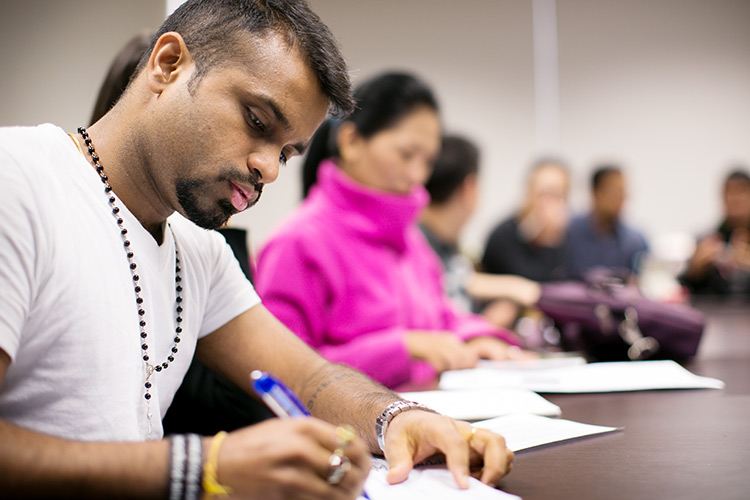
Reflection can serve as a guide for future action.
A reflective model
For those new to reflective writing it may be wise to follow a simple but effective model which can be used to guide the writing process.
Rolfe, Freshwater and Jasper (2001) created a reflective model based upon three simple questions: What? So what? Now what?
The reflective model
Description
The What? part is simply describing the situation:
- What happened?
- Who was involved?
Theory and knowledge
The So what? part is where what happened is analysed and explained, often in relation to supporting literature.
It is where most of the references will be, if required.
- What is most important/interesting/relevant/useful aspect of the event/idea/situation?
- How can it be explained?
Action
The final part, Now what?, is the one that can make the greatest contribution to practice:
- What have I learned?
- How can it be applied in the future?
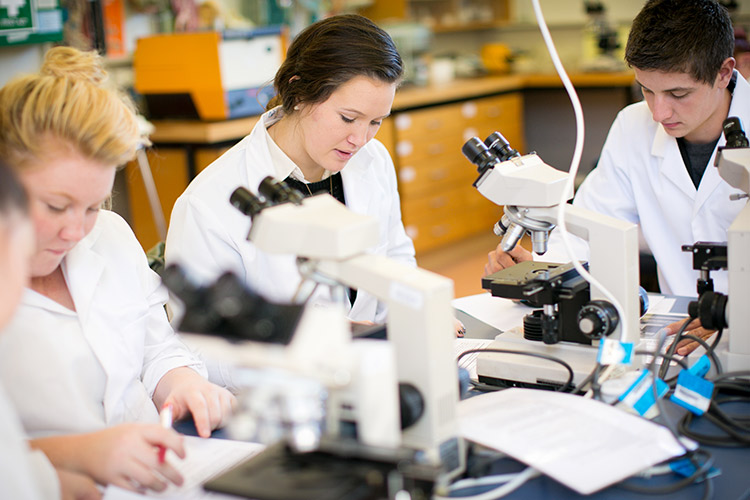
What to include
Don't just describe: explore and explain what happened.
Be honest: it's ok to admit to making mistakes as well as success. However, you should also show how you understand why things happen and what you are going to do to improve.
Be selective: you don’t have to write about everything that happened, just key events or ideas.
Look to the future: reflect on what happened in the past and how it will have an impact on future ideas or activities.
Examples of reflective questions
Use some of these questions based on the “What? So What? Now what?” model to stimulate ideas for your writing.
What? Example questions
What are the facts? What do you feel about them?
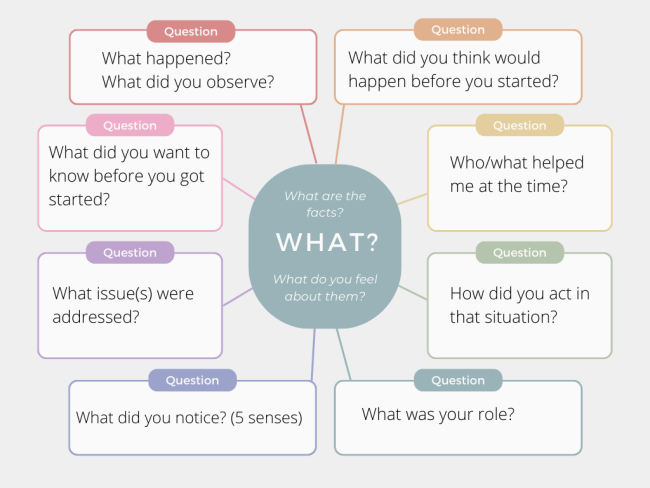
So what? Example questions
Why did it happen this way? How does this relate to your past experiences?
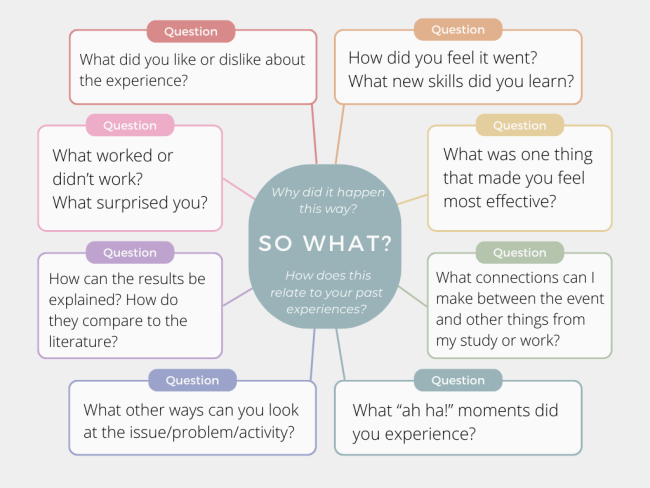
Now what? Example questions
What have you learned? How can you apply this in the future?
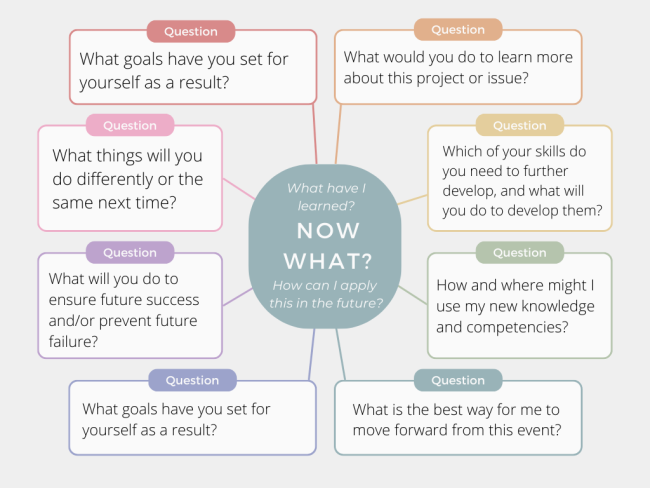
Reflective writing style
Structure
The structure of a reflective essay is very similar to the structure of most academic writing.
It contains an introduction that sets the scene for the essay. There is a body of paragraphs that detail the reflection process, with each paragraph addressing one key issue and linking logically from one to the next. It finishes with a conclusion that draws together all of the main points covered in the essay.
There are two main ways reflective writing can be structured around the what, so what, now what, model:
-
An individual issue could be highlighted and then applied to all three processes. A single paragraph may then encompass all three parts.
-
Or, the body of the essay could have three main sections, first a description of the event as a whole (What?), then an analysis of what happened (So what?), finishing with how new learnings can be applied in the future (Now what?).
Pronouns
In contrast to most academic writing, first person narrative is used in reflective writing. ‘I’ becomes necessary when describing personal observations and feelings. However, it is also common to move between first and third person writing when making general comments and referring to the literature. See the example below.
Tenses
Reflective writing often requires movement between past, present and future tenses, depending on whether actual events are being recounted, a more general comment is being made or a projection about the future is proposed. See the example below.
Referring to the literature
It may be a requirement of the assignment that theory is used that supports a reflection, and obviously all sources for ideas must be acknowledged. These can be placed in a reflective essay similar to any academic essay.
|
By the end of the session, I had (first person) a greater understanding of Garden’s (1983) (theory) multiple intelligences theory and this allowed me (past tense) to know myself as a learner more deeply. Visual-spatial intelligence is one of my strengths, and so I have enjoyed experimenting with the use of mind maps, Venn diagrams and charts to organise my thinking around my design project. I feel (first person) that this has improved my ability to understand, retain and apply concepts. Jones (2013) (theory) states that (present tense) only when a student (third person) understands how they learn best can new concepts be fully grasped. This insight into my own learning means I will (future tense) start my next project with a new-found confidence in my own abilities. |

Reflective vocabulary
It is important to use appropriate language which highlights the various stages of the reflection process.
-
Vocabulary for reflection
What?
This part should include descriptive language that helps the reader understand what happened.
Try to be brief by only focussing on the significant details, such as who, when, where, why and how.
-
Vocabulary for reflection
So what?
These phrases will help you to show how you interpreted the issue being discussed.
Example phrases
For me, the meaningful/ significant/ important/ relevant/ useful aspect/ element/ issue/ idea/ experience/ learning was/ arose from/ happened when/ resulted from.....
-
Vocabulary for reflection
So what?
You should then explain how this affected you and your understanding.
Example phrases
Previously/ at the time/ at first/ initially/ subsequently/later I thought/ felt/ knew/ noticed/ questioned/ realised (or ‘did not think/did not realise, etc.”) that/ why/ how/ if....
-
Vocabulary for reflection
So what?
Following this, try to make clear why you understood it that way.
Example phrases
This might be/ is perhaps/ could be/ is probably because of/ due to/ explained by/ related to...
-
Vocabulary for reflection
Now what?
Now you need to show how this has allowed you to develop your practice or understanding.
Examples sentences
Having reflected on/ analysed/ read/ understood/ developed I now feel/ think/ realise/ wonder/ question….
-
Vocabulary for reflection
Now what?
The last thing to look at is what effect it will have on your future practice or understanding.
Example sentences
I can now/ will now/ have to/ am now able to.
I can now/ will now/ have to/ am now able to improve(d)/ understand/ gain(ed)/ better/ use/ develop....
References
Attributions
Hero image: Close up of painting by Fiona Art. Licensed under a Pexels.com license.



